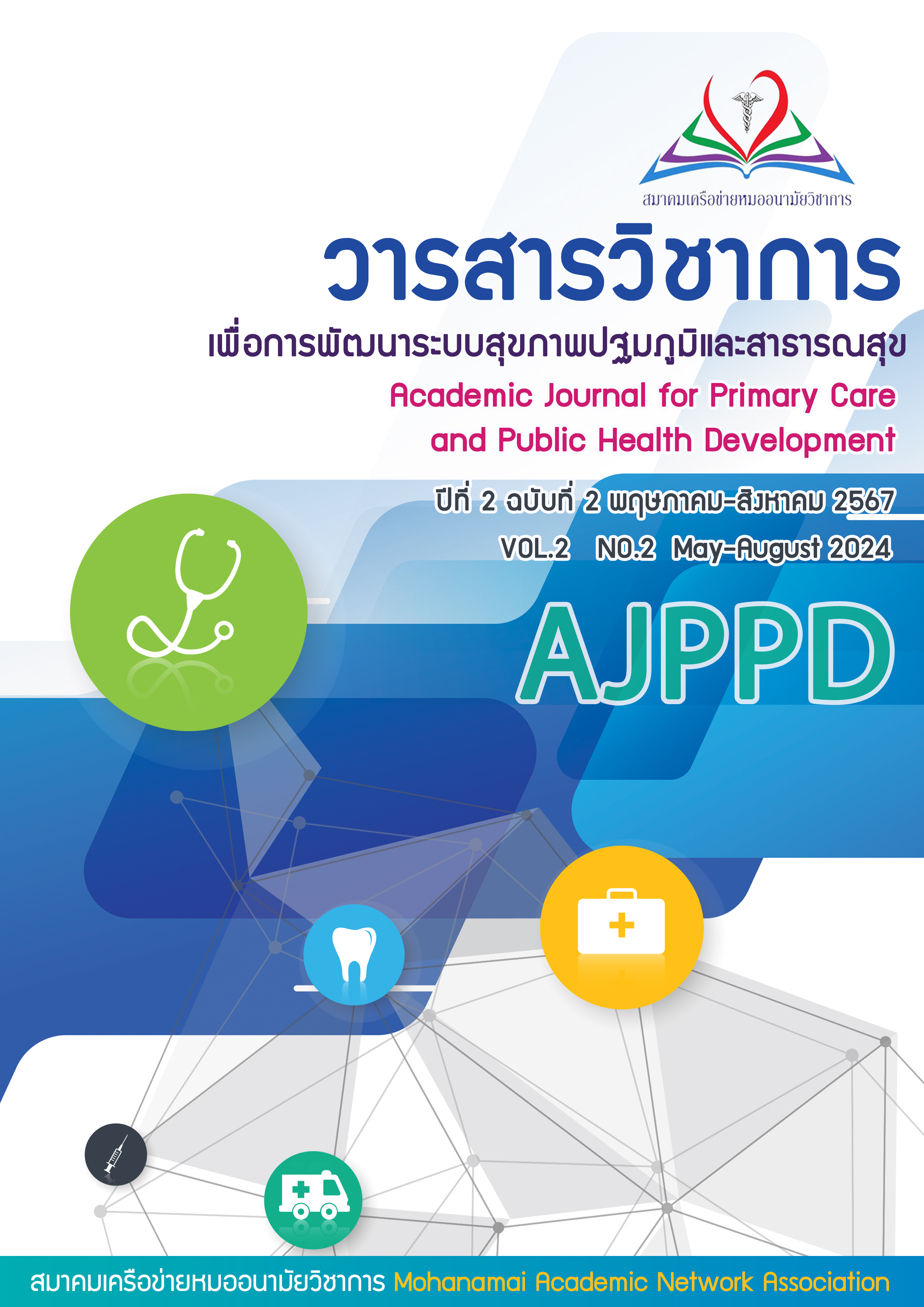The Effects of a Health Belief Model Program on Promoting Infection Prevention Behaviors Among Pulmonary Tuberculosis Patients
Keywords:
Health Belief Model, Infection Prevention Behaviors, Pulmonary TuberculosisAbstract
This research aimed to examine the effects of a health belief model program on promoting infection prevention behaviors among pulmonary tuberculosis patients. A quasi-experimental research design with a one-group pretest-posttest was employed. The sample consisted of 25 pulmonary tuberculosis patients registered for treatment at the tuberculosis clinic of Phichai Hospital. The research instruments included a questionnaire and a program applying the health belief model and social support. Data were analyzed using descriptive statistics and paired t-tests.
The results showed that after the experiment, the sample group had significantly higher mean scores in tuberculosis knowledge, health belief model constructs, and tuberculosis infection prevention behaviors compared to before the experiment (p < 0.05). Significant increases were observed in perceived susceptibility, perceived severity, perceived benefits, and perceived barriers to tuberculosis infection prevention. Additionally, the consistency of tuberculosis medication adherence increased from 84.0% to 100.0%. The health belief model program was effective in promoting infection-prevention behaviors among pulmonary tuberculosis patients.
References
กองวัณโรค กระทรวงสาธารณสุข. (2564). รายงานสถานการณ์วัณโรคเดือนมีนาคม. https://www.tbthailand.org/
download/form/รายงานสถานการณ์วัณโรคเดือนมีนาคม.pdf
ขวัญใจ ม่อนไธสง. (2560). ปัจจัยทำนายพฤติกรรมการป้องกันวัณโรคของผู้สัมผัสร่วมบ้านกับผู้ป่วยวัณโรคปอดที่พักอาศัยในกรุงเทพมหานครและปริมณฑล. วารสารพยาบาลทหารบก, 18(พิเศษ), 306-314.
สำนักวัณโรค กรมควบคุมโรค. (2561). แนวทางการควบคุมวัณโรคประเทศไทย พ.ศ. 2561. นนทบุรี: กรมควบคุมโรค กระทรวงสาธารณสุข.
Becker, M. H., & Maiman, L. A. (1980). Social behavioral determinants of compliance with health and medical care recommendations. Medical Care, 18(5), 623-637.
Chen, W., Zhang, H., & Li, C. (2022). Implementation of Health Belief Models (HBM) Education for Tuberculosis Patients at the Tamansari Primary Health Care, Tasikmalaya City. ABDIMAS: Jurnal Pengabdian Masyarakat, 4(2), 1120. https://doi.org/10.35568/abdimas.v4i2.1120
Li, Y., Liu, X., Wang, Z., & Zhao, Y. (2020). Effects of Education Programs on Awareness and Behavior in Patients with Tuberculosis. Journal of Quality in Public Health, 5(1), 261. https://doi.org/10.30994/jqph.v5i1.261
Pender, N. J., Murdaugh, C. L., & Parsons, M. A. (2011). Health Promotion in Nursing Practice (6th ed.). Pearson.
Strecher, V. J., & Rosenstock, I. M. (1997). The health belief model. In K. Glanz, F. M. Lewis, & B. K. Rimer (Eds.), Health behavior and health education: Theory, research, and practice (pp. 31-36). Jossey-Bass.
Tang, X., Wang, Q., Chen, M., Qian, X., & Huang, J. (2019). Application of Health Belief Model in Improving Patients' Pulmonary Tuberculosis Knowledge and Behavior. PLoS ONE, 14(2), e0211728. https://doi.org/10.1371/journal.pone.0211728
World Health Organization. (2018). Global Tuberculosis Report. Geneva: WHO.
World Health Organization. (2021). Global tuberculosis report 2021. https://www.who.int/publications/i/item/9789240037021
Zhang, S., Li, X., & Zhu, Y. (2021). Application of KTH-integrated Nursing Model in Care of Patients with Multi-drug Resistant Tuberculosis. American Journal of Translational Research, 13(6), 6855-6863.

Downloads
Published
How to Cite
Issue
Section
License

This work is licensed under a Creative Commons Attribution-NonCommercial-NoDerivatives 4.0 International License.





